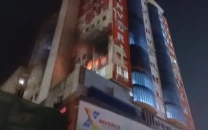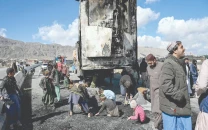Opportunity but risk for US as Pakistan votes
US experts see election front-runner Nawaz Sharif as a pragmatist rather than ideologue.

Supporters of Pakistan Muslim League Nawaz (PML-N) attend a rally along with a stuffed tiger. PHOTO: AFP/FILE
Experts believe the fundamental calculus of the United States will remain unchanged whatever the outcome of Saturday's election - that it needs Islamabad's cooperation to fight militants in Pakistan and Afghanistan.
The United States has been careful not to take sides in the election, knowing that its blessing could be the kiss of death in a country where a recent poll put US popularity at a mere 11 percent.
Instead, the United States has confined its public remarks to praise of the election itself. Despite violence, the vote marks the first democratic transition in Pakistan's nearly 66-year history.
State Department spokesman Patrick Ventrell called the election "a historic development of which the people of Pakistan can be very proud" and said:
"We look forward to engaging with the next democratically elected government."
Nawaz the 'pragmatist'
Pakistan Muslim League - Nawaz (PML-N) chief Nawaz Sharif, seen as the front-runner, has criticised the US-friendly policies of President Asif Ali Zardari.
Nawaz has demanded an end to unpopular US drone strikes inside Pakistan and called for negotiations with the Taliban.
But the United States knows Nawaz well from his two stints as prime minister in the 1990s and most US experts see him as a pragmatist rather than ideologue.
Nawaz has campaigned not about the United States but the troubled economy - an issue on which it makes little sense to alienate Washington, which would be critical to securing another IMF package and has provided $20 billion to Pakistan since the countries entered a troubled partnership in 2001.
Seth Jones, an expert at the Rand Corp and former US military adviser, noted that tensions have eased considerably since the crisis following the US raid that killed Osama bin Laden in 2011.
"There is an opportunity for engaging a new civilian leadership that will ideally have at least a short honeymoon period," Jones said.
"I think there is an opportunity to reset the US relationship with Pakistan on some key issues - the security threats in Pakistan, some key economic issues," he said.
President Barack Obama's administration put an early priority on strengthening democratic rule in Pakistan, although it quickly learned that the long-dominant military remained a vital power-centre.
Secretary of State John Kerry has met army chief General Ashfaq Kayani three times since taking office, although the administration recently named a special envoy, James Dobbins, to step up interaction with Pakistan and Afghanistan.
Coalition imminent
A third key player in the election, Pakistan Tehreek-e-Insaf (PTI) chairman Imran Khan, has been more outspoken than Nawaz or Zardari in criticism of the United States. But whoever wins will likely need to put together a coalition - which could prove unwieldy and, in Nawaz's case, include figures anathema to Washington.
A congressional aide who follows Pakistan warned that Nawaz could enter a coalition with hardline parties viewed as supportive of the deadly wave of violence against the country's Shias and other religious minorities.
While US officials have focused on the historic milestone of the democratic election, "it's going to be important for the administration to focus on what happens next in Pakistan, and which leaders we are going to have to work with to advance our interests in Pakistan," the congressional aide said.
"It doesn't seem as if the administration has thought that far along yet," he told AFP on condition of anonymity.
Analysts said that no matter who wins, vital US interests will remain in the world's sixth most populous nation with its nuclear arsenal, youth bulge and extremism problems.
The next government may try to renegotiate an agreement on supply routes into Afghanistan, a critical priority as the United States plans to pull out combat troops next year.
Daniel Markey, a senior fellow at the Council on Foreign Relations, called a US exit from Pakistan "simply impossible."
"That does not mean we have to continue on with the degree of involvement that we have," he said, "but we will remain engaged with the challenge that is posed by this country, Pakistan, forever."



















COMMENTS
Comments are moderated and generally will be posted if they are on-topic and not abusive.
For more information, please see our Comments FAQ